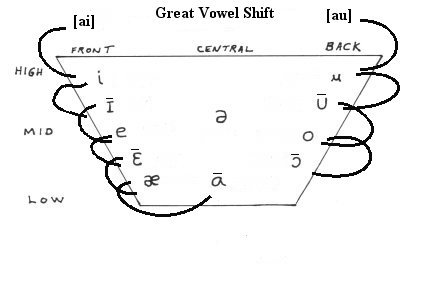


This was a period of social upheavals, for many reasons, and the result was that people from Northern England, and from the Midlands came into greater contact, in larger numbers, with people in the south, especially in London. The first one is to do with the movement of people around the country. With the Great Vowel Shift, the honest answer is that we don’t really know why it happened: we can’t be sure. So change and language evolution is a normal, natural process and is nothing new. Otherwise we’d all be speaking in the same way as King Alfred the Great, or perhaps even the same way as early tribes, and there would be no need to learn any foreign languages, as we’d all speak the same one. Why does language change?įirst of all, languages change all the time. Not only that, but of course, some words escaped the process completely and did not go through the change. The Great Vowel Shift largely affected stressed vowels. The point is that in ‘only’ the stress (the vowel that we pronounce most strongly) falls on the O. But we don’t use the same sound for the O as we do in ‘hot’. We say ‘ee’ for the Y in ‘only’, for example. There are still words in Modern English that pronounce vowels in the same way as in other European languages. And you may be interested to hear that I chose ‘sheep’ for a reason it would have sounded like ‘shep’, with a slightly longer vowel. Notice how your tongue moves to a different position in the mouth in order to make the ‘ee’ sound. Make a vowel sound like the E in ‘bed’, and then say ‘sheep’. We say they moved, because the position of the tongue and the mouth in order to articulate (to produce the sounds) changed. Vowels in English shifted: that is, they moved. The main changes could really be seen during the 15 th century and at the start of the 16 th century, although the process continued well into the 18 th century. It took a long time and many generations. This was not something that could happen overnight people didn’t all wake up one morning and decide all at the same time to pronounce their language differently. The changes began in the 12 th century, but this was only the start. The theory is that older forms of English, up to the period known as Early Middle English, pronounced the long vowels in much the same way as in Latin: like modern Italian or Spanish, or even German. It describes the process that English went through to have such different pronunciation from its neighbours. This term was invented by a Danish scholar, Otto Jespersen, who studied this phenomenon. Why is it communicare, with the final three letters pronounced ah-reh in Italian, but communicate in English, the A with a different sound? Listen to the difference here.Īn important reason for these differences is known as the Great Vowel Shift. In English we say dee-side, but in French the letter i is pronounced /i/ (with an ee sound). Listen to the difference here on Google Translate. Take a look at the French word décider – can you guess what it means in English? If you thought it means decide, then you are right! We can see that it is from the same root, but the pronunciation is very different. Vowels, as you may have learned in school are the letters a e i o u and y.

The difference is in the way that vowels are pronounced. But why is the pronunciation so often so different in English? Perhaps you may even have been told that some of them are derived from Latin or Greek, or that they have Germanic roots. If you have learnt a foreign language, or if you are bilingual in another European language, you may have noticed that there are a number of words that are similar to words in English.


 0 kommentar(er)
0 kommentar(er)
